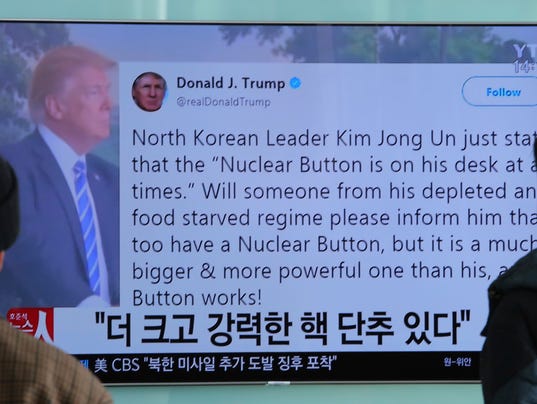Trump claims his nuclear button is bigger and more powerful than Kim Jong-Un's, but in reality it orders a Diet Coke. Nathan Rousseau Smith (@FantasticMrNate) explains. Buzz60
WASHINGTON – President Trump's critics say his Twitter diplomacy is bad enough – but nuclear diplomacy by tweet could have explosive consequences.
A Tuesday night post all but threatening to blow up North Korea – the highlight of a striking 16-tweet day in which the president also promised to hold a ceremony to slam "the most dishonest and corrupt media" and suggested an aide to a previous political rival go to jail – has ignited new questions about Trump's judgment.
"Trump's latest tweets will convince many world leaders that not only is he unstable and unreliable, but potentially truly dangerous," said nuclear policy expert Joe Cirincione.
In an attempt to one-up North Korean leader Kim Jong Un, who reportedly claimed to have a "nuclear button" on his desk, Trump tweeted Tuesday night: "Will someone from his depleted and food starved regime please inform him that I too have a Nuclear Button, but it is a much bigger & more powerful one than his, and my Button works!"
Kori Schake, a National Security Council official during the George W. Bush administration, said "infantilism is a dangerous foreign policy" – especially when it involves nations with nukes.
"Not only does the President's recklessness make war more likely," Schake said, "it will also deprive us of allied support should war come." Analysts also said they may also be less inclined to share intelligence about threats from Kim Jong Un or other bad actors if they think it could lead to an ill-considered conflict –
While Trump and aides say they want to resolve the North Korea nuclear standoff peacefully, the reference to button size is sure to raise anxiety levels from the Pentagon to foreign capitals. (Important note: The idea of a "nuclear button" is a colorful metaphor; presidents would authorize nuclear strikes through a series of launch codes.)
Trump and his aides have said they do not want to use military force, but they have not ruled it out. In August, as North Korea threatened to attack Guam with intercontinental ballistic missiles, Defense Secretary James Mattis said the human toll of a nuclear confrontation "would be catastrophic."
White House spokeswoman Sarah Sanders said Trump is not "taunting" Kim via Twitter, but re-affirming his determination to stop the North Korean's nuclear threats. She also threw in a political shot at the administration of predecessor Barack Obama, saying he ignored the problem. "This is a president who leads through strength," Sanders said.
Asked bluntly about Trump's "mental fitness" for his office, Sanders told reporters that Americans instead "should be concerned about the mental fitness of the leader of North Korea."
Trump's latest tweets, said David Rothkopf, a senior fellow at the Johns Hopkins University School of Advanced International Studies, "make our allies uneasy because they reveal the president to be erratic and extreme. They make our enemies more likely to respond dangerously for the same reason."
The big fear: that Trump's aggressive rhetoric could be misunderstood by those adversaries, leading one way or another to a nuclear exchange. It's a long-held criticism of Trump: While accepting the Democratic nomination for president in 2016, Hillary Clinton said, "A man you can bait with a tweet is not a man we can trust with nuclear weapons."
Now that he's president, there could be other ripple effects that come from such a perception, including a weakening of alliances. That would make it harder for the United States to achieve global goals, whether it's disarming North Korea or improving the international trading system.
Even for a president who specializes in provocative statements, Tuesday was an extraordinary day. Trump appeared to call for prosecutions of former Hillary Clinton aide Huma Abedin and ex-FBI Director James Comey. He threatened to yank U.S. aid to Pakistan and the Palestinian Authority. And of course, he attacked the media.
Cirincione, president of Ploughshares Fund, a global security foundation, said the tweets may mean allies will "move further away from us, starting with South Korea and Europe, and our adversaries conclude that they cannot make a deal with us."
Allies might also be loath to exchange information on military moves or intelligence operations with a president they consider erratic, analysts said. His behavior has already been a challenge, they said, citing reports that Trump discussed classified information provided by Israel during a White House meeting with Russian officials in May.
It all gives allies "unease," said Julianne Smith, director of the Transatlantic Security Program at the Washington-based Center for a New American Security. "They're not exactly confident that Trump will protect classified information at every turn," said Smith, a national security official during the Obama administration.
The president used social media more sedately Wednesday morning: A single tweet backing protesters who are marching against the Islamic fundamentalist government in Iran, a theme he has promoted repeatedly in recent days.
Trump has repeatedly said he has no plans to abandon Twitter, saying it is way to reach his voters around the despised news media.
In a missive over the weekend, Trump said he uses social media "not because I like to, but because it is the only way to fight a VERY dishonest and unfair 'press,' now often referred to as Fake News Media."
Many of Trump's fans like his aggressive style, particularly on Twitter.
Michael Flynn, Jr., son of the former Trump national security adviser who pleaded guilty to lying to the FBI about his contacts with Russians, re-tweeted the president's North Korea "button" message. He added: "This is why Trump was elected. A no bullsh#t leader not afraid to stand up for his country."
Read or Share this story: https://usat.ly/2CzEEok

No comments:
Post a Comment